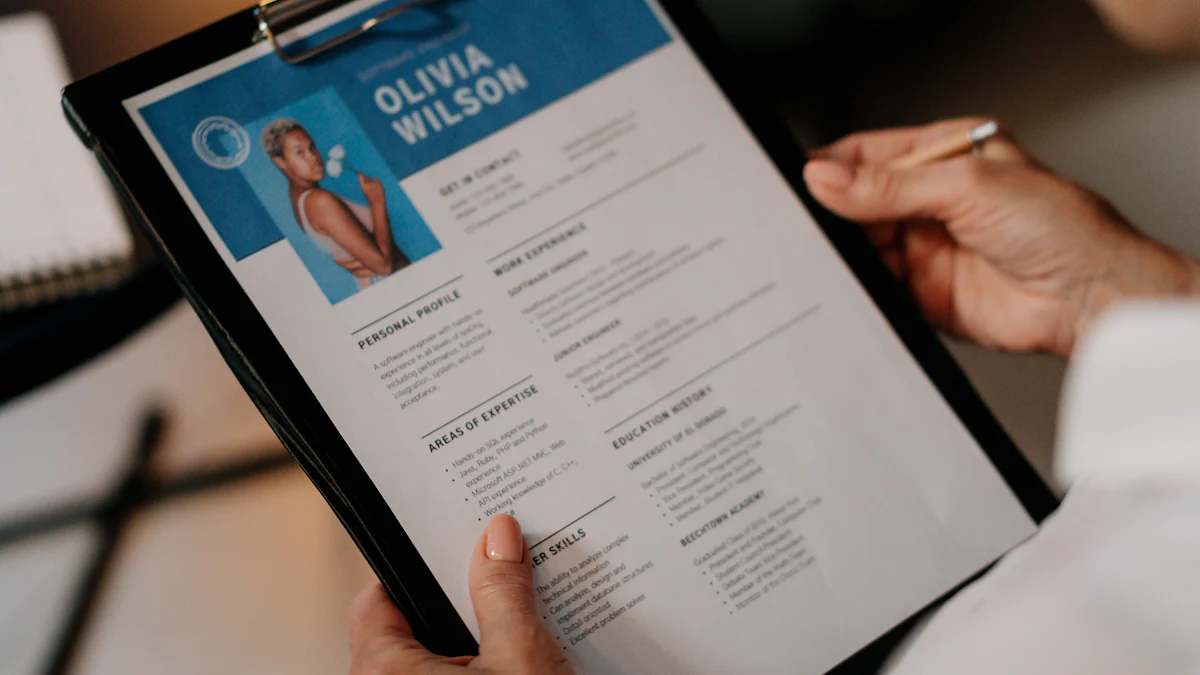Mastering AI Hiring Software for Efficient Recruitment

Artificial intelligence is transforming the recruiting landscape. AI hiring software enhances recruitment efficiency by automating tasks and providing data-driven insights. You can experience a 50% increase in the quality of hires, as AI accurately assesses candidates' skills and qualifications. With 87% of companies integrating AI into their recruitment processes, mastering this technology becomes crucial for modern hiring practices. AI not only speeds up the recruitment process but also ensures a more objective evaluation of candidates, making it an indispensable tool for today's recruiters.
Key Takeaways
AI hiring software can boost the quality of hires by up to 50% by accurately assessing candidates' skills and qualifications.
Automating repetitive tasks like resume screening and interview scheduling allows recruiters to focus on strategic activities, enhancing overall efficiency.
AI enhances the candidate experience through timely updates and personalized interactions, improving your employer brand.
Understanding the difference between AI and machine learning is crucial for developing effective recruitment strategies that leverage both technologies.
AI tools help reduce bias in hiring by evaluating candidates based on objective criteria, promoting diversity and inclusion in the workplace.
Selecting the right AI recruiting tool involves considering factors like scalability, integration, and user-friendliness to align with your organization's goals.
Continuous learning and adaptability are essential skills for recruiters in the AI era, ensuring they stay competitive and effective in their roles.
Understanding AI in Recruitment
Defining AI and Its Role in Recruitment
What is AI in the context of recruitment?
Artificial intelligence, or AI, in recruitment refers to the use of advanced algorithms and machine learning models to enhance the hiring process. AI hiring software analyzes resumes, extracts key information, and matches candidates with job requirements. This technology automates repetitive tasks, allowing you to focus on more strategic aspects of recruiting. AI-powered technology not only speeds up the process but also ensures a more objective evaluation of candidates.
Key functionalities of AI in hiring processes
AI recruitment software offers several key functionalities that streamline the hiring process. It automates resume parsing, categorizes data, and compares candidate profiles against job criteria. AI-driven recruiting tools also include features like automated interview scheduling, video assessments, and engagement scoring. These tools provide personalized job recommendations and intelligent search capabilities, enhancing the overall candidate experience.
Benefits of AI in Recruitment
Time-saving and efficiency
AI significantly reduces the time spent on administrative tasks. By automating resume screening and candidate sourcing, AI allows you to focus on engaging with top candidates. This efficiency leads to faster hiring processes and a reduction in time-to-hire. AI-driven recruiting strategies can improve your workflow, making recruitment more efficient and effective.
Enhanced candidate experience
AI enhances the candidate experience by providing timely updates and personalized interactions. AI-powered chatbots can answer candidate queries and schedule interviews, ensuring a smooth and engaging process. By using AI, you create a more positive experience for candidates, which can improve your employer brand and attract top talent.
AI vs. Machine Learning: Importance for Recruiters
Distinguishing AI from Machine Learning
Definitions and differences
Artificial Intelligence (AI) and Machine Learning (ML) often appear together, but they are not the same. AI refers to the broader concept of machines being able to carry out tasks in a way that we would consider "smart." It encompasses various technologies, including ML, which is a subset of AI. ML involves algorithms that allow computers to learn from data and improve over time without being explicitly programmed. Understanding these differences helps you grasp how each can be applied in recruitment.
Practical applications in recruitment
In recruitment, AI automates tasks like resume screening and candidate sourcing. It uses algorithms to analyze large volumes of data quickly. ML, on the other hand, enhances AI by learning from past hiring decisions to improve future outcomes. For example, ML can identify patterns in successful candidates' profiles, helping you make more informed hiring decisions. By leveraging both AI and ML, you can streamline your recruitment processes and find ideal candidates efficiently.
Why Understanding This Difference Matters
Impact on recruitment strategies
Knowing the distinction between AI and ML impacts your recruitment strategies significantly. AI can handle repetitive tasks, freeing up your time for strategic activities. ML provides insights by analyzing data trends, which can inform your recruitment strategies. By understanding these technologies, you can develop more effective recruitment plans that align with your organization's goals.
Leveraging technology for better outcomes
Leveraging AI and ML in recruitment leads to better outcomes. AI reduces bias by evaluating candidates based on data rather than human judgment. ML continuously improves the accuracy of these evaluations by learning from past data. By integrating these technologies, you enhance the quality of your hires and create a more efficient recruitment process. This approach not only saves time but also ensures a fair and objective evaluation of candidates.
Why AI is Crucial for Recruitment Efficiency
Automation of Repetitive Tasks
AI hiring software plays a pivotal role in streamlining recruitment processes. By automating repetitive tasks, you can significantly enhance efficiency. AI handles administrative duties like resume screening and interview scheduling, allowing you to focus on strategic activities. This automation reduces the time-to-hire, enabling you to fill positions faster and more effectively. With AI-powered technology, you can manage high volumes of applications without the need for additional resources.
Personalization and Data Insights
Personalization in recruitment is essential for attracting top talent. AI enables you to tailor candidate interactions, providing a more engaging experience. By analyzing data, you can gain valuable insights into candidate preferences and behaviors. These data-driven insights allow you to make informed decisions, improving the quality of hires. AI insights help you identify the best channels for reaching potential candidates, optimizing your talent acquisition strategy.
Bias Control and Diversity
Artificial intelligence is instrumental in promoting diversity and inclusion in the workplace. AI helps mitigate unconscious bias by evaluating candidates based on objective criteria rather than subjective judgment. This ensures a fair and equitable recruitment process. By using AI recruiting tools, you can promote diversity, equity, and inclusion, creating a more balanced workforce. AI not only enhances the quality of hires but also supports your organization's commitment to diversity.
Challenges of Implementing AI in Recruitment
Implementing artificial intelligence in recruitment presents several challenges that you must navigate to ensure success. Understanding these challenges helps you prepare and adapt your strategies effectively.
Data Quality and Management
Importance of accurate data
Accurate data forms the backbone of any successful AI implementation in recruiting. You rely on data to train AI algorithms, making it crucial for the data to be precise and comprehensive. Inaccurate data can lead to flawed AI models, resulting in poor hiring decisions. Ensuring data accuracy involves regular audits and updates to maintain its integrity. This step is vital for achieving reliable outcomes in recruitment automation.
Overcoming data-related challenges
Managing data quality involves overcoming several challenges. You need to address issues such as data silos, where information is scattered across different systems, making it difficult to access and analyze. Implementing a centralized data management system can help you streamline data collection and analysis. Additionally, you must ensure compliance with data privacy regulations to protect candidate information. By tackling these challenges, you enhance the effectiveness of AI in your talent acquisition efforts.
Securing Buy-In from Stakeholders
Addressing concerns and misconceptions
Securing buy-in from stakeholders is essential for successful AI implementation. Many stakeholders may have concerns about AI's role in recruitment. According to a survey, 66% of U.S. adults express reluctance to apply for jobs where AI plays a major role in hiring decisions. Addressing these concerns involves educating stakeholders about AI's benefits and dispelling misconceptions. You can highlight how AI enhances recruitment efficiency and reduces bias, ensuring a fair hiring process.
Demonstrating ROI and benefits
To gain stakeholder support, you must demonstrate the return on investment (ROI) and benefits of AI in recruitment. Emphasize how AI can lead to a 50% increase in the quality of hires and a reduction in time-to-hire. Presenting case studies and success stories can help illustrate AI's positive impact on recruitment processes. By showcasing tangible benefits, you can convince stakeholders of AI's value in enhancing recruitment outcomes.
Overview of AI Recruiting Tools

Artificial intelligence has revolutionized the way you approach recruiting. With a variety of AI tools available, you can streamline your recruitment processes and enhance your ability to find the right talent. These tools offer a range of functionalities that cater to different aspects of the hiring process.
Popular AI Tools and Their Functionalities
Features and capabilities
AI recruiting tools come equipped with numerous features designed to optimize your recruitment efforts. Some of the key functionalities include:
Automated Resume Screening: AI tools can quickly analyze resumes, extracting relevant data to match candidates with job requirements.
Candidate Engagement: Chatbots and automated messaging systems keep candidates informed and engaged throughout the hiring process.
Predictive Analytics: These tools use data to forecast candidate success, helping you make informed hiring decisions.
Interview Scheduling: AI can automate the scheduling of interviews, saving you time and reducing administrative burdens.
Talent CRM: Manage your talent pool effectively with AI-driven customer relationship management systems.
Use cases and success stories
Many organizations have successfully integrated AI recruiting tools into their hiring processes. For instance, Arya leverages AI to enhance applicant sourcing and engagement, while iCIMS offers solutions for candidate sourcing and analytics. These tools have helped companies reduce time-to-hire and improve the quality of their hires. By automating repetitive tasks, these AI tools allow you to focus on strategic recruitment activities.
Selecting the Right Tool for Your Organization
Factors to consider
When choosing an AI recruiting tool, consider several factors to ensure it aligns with your organization's needs:
Scalability: Ensure the tool can handle your recruitment volume as your organization grows.
Integration: Check if the tool integrates seamlessly with your existing HR systems.
User-Friendliness: Opt for tools that are easy to use and require minimal training.
Cost: Evaluate the cost-effectiveness of the tool in relation to its features and benefits.
Aligning tools with recruitment goals
Aligning AI tools with your recruitment goals is crucial for maximizing their effectiveness. Determine what you aim to achieve with AI, whether it's improving candidate engagement, reducing bias, or enhancing data-driven decision-making. Choose tools that support these objectives and provide the functionalities you need to reach your goals. By doing so, you can ensure that your AI recruiting strategy is both efficient and effective.
AI's Role in Supporting Diversity, Equity, and Inclusion

Artificial intelligence plays a pivotal role in enhancing diversity, equity, and inclusion (DEI) within recruitment processes. By leveraging AI, you can create a more inclusive hiring environment that actively reduces biases and promotes fairness.
Enhancing DEI Initiatives
Identifying and Reducing Bias
AI can help you identify and reduce bias in recruitment. Algorithms can inadvertently pick up biases from the data they are trained on, leading to unfair hiring practices. To combat this, you should use diverse data sets and regularly review algorithms. Implementing bias detection features ensures that AI systems evaluate candidates fairly. This proactive approach helps you create a more equitable hiring process.
Creating Inclusive Hiring Practices
AI supports the creation of inclusive hiring practices by providing tools that promote fairness. By using AI-driven recruitment tools, you can ensure that all candidates receive equal consideration. These tools help you focus on skills and qualifications rather than subjective judgments. AI enables you to reach a broader pool of candidates, ensuring that talented individuals from diverse backgrounds have equal opportunities.
Measuring DEI Success with AI
Metrics and Analytics
Measuring DEI success requires the use of metrics and analytics. AI provides you with the ability to track and analyze data related to diversity and inclusion. By examining these metrics, you can assess the effectiveness of your DEI initiatives. AI tools offer insights into candidate demographics, helping you identify areas for improvement. This data-driven approach allows you to make informed decisions that enhance your DEI efforts.
Continuous Improvement Strategies
Continuous improvement is essential for successful DEI initiatives. AI helps you develop strategies that evolve over time. Regular audits of AI models ensure that they remain unbiased and effective. By refining these models, you can address any emerging issues and maintain a fair hiring process. AI empowers you to adapt your strategies based on data insights, leading to ongoing improvements in diversity and inclusion.
How AI is Changing the Role of Recruiters
Evolving Responsibilities
From administrative tasks to strategic roles
AI is transforming the landscape of recruiting by shifting your focus from mundane administrative tasks to more strategic roles. You no longer need to spend countless hours sifting through resumes or scheduling interviews. AI handles these tasks efficiently, allowing you to concentrate on building relationships with candidates and developing innovative recruitment strategies. This shift not only enhances your productivity but also elevates your role within the organization.
Embracing technology for better outcomes
Embracing AI technology leads to better outcomes in recruiting. AI interview chatbots, for instance, conduct initial interviews with candidates using natural language processing and speech recognition technologies. These chatbots provide valuable insights, helping you make informed decisions. By leveraging AI, you can enhance the quality of your hires and improve the overall candidate experience. This technological embrace positions you as a forward-thinking recruiter, ready to meet the demands of modern recruitment.
Skills Recruiters Need in the AI Era
Technical proficiency
In the AI era, technical proficiency becomes essential for recruiters. You need to understand how AI tools work and how to integrate them into your recruitment processes. Familiarity with AI-driven platforms and data analytics tools enables you to harness their full potential. This proficiency allows you to optimize your recruiting strategies and make data-driven decisions that align with your organization's goals.
Adaptability and continuous learning
Adaptability and continuous learning are crucial skills for recruiters in the AI era. The rapid evolution of AI technologies requires you to stay updated with the latest trends and advancements. You must be willing to learn and adapt to new tools and methodologies. This mindset ensures that you remain competitive and effective in your role. By embracing continuous learning, you can navigate the challenges of AI integration and drive successful recruitment outcomes.
Artificial intelligence is revolutionizing the recruiting landscape. AI hiring software transforms how you approach talent acquisition by automating tasks and providing data-driven insights. This technology allows you to identify top candidates efficiently, enhancing the quality of hires. By embracing AI, you can streamline processes, reduce bias, and make informed decisions. As a recruiter, adapting to these AI-driven changes is essential. You gain more time to focus on strategic activities and relationship-building. Embrace AI recruiting tools to enhance recruitment efficiency and stay ahead in the competitive talent market.
FAQ
What is AI Recruitment, and how does it work?
AI Recruitment uses advanced algorithms to streamline the hiring process. It analyzes resumes, matches candidates with job requirements, and automates repetitive tasks. This technology allows you to focus on strategic recruiting activities by handling administrative duties efficiently.
How does AI Recruitment improve the candidate’s experience?
AI enhances the candidate experience by providing timely updates and personalized interactions. AI-powered chatbots answer queries and schedule interviews, ensuring a smooth process. This approach creates a positive experience for candidates, improving your employer brand.
What key features does AI Recruitment offer?
AI Recruitment tools offer several features to optimize your hiring process:
Automated Resume Screening: Quickly analyzes resumes to match candidates with job criteria.
Candidate Engagement: Keeps candidates informed and engaged through chatbots.
Predictive Analytics: Uses data to forecast candidate success.
Interview Scheduling: Automates the scheduling of interviews.
Talent CRM: Manages your talent pool effectively.
How does AI help in reducing bias in recruitment?
AI reduces bias by evaluating candidates based on objective criteria rather than subjective judgment. It ensures a fair recruitment process by focusing on skills and qualifications. This approach promotes diversity and inclusion in your hiring practices.
Can AI Recruitment tools integrate with existing HR systems?
Yes, many AI Recruitment tools integrate seamlessly with existing HR systems. This integration allows you to streamline your recruitment processes and manage data efficiently. Ensure the tool you choose aligns with your organization's needs and systems.
What are the challenges of implementing AI in recruitment?
Implementing AI in recruitment presents challenges such as data quality management and securing stakeholder buy-in. Accurate data is crucial for training AI algorithms. You must also address concerns and misconceptions about AI's role in hiring.
How do AI tools support diversity, equity, and inclusion initiatives?
AI tools support DEI initiatives by identifying and reducing bias in recruitment. They ensure all candidates receive equal consideration, focusing on skills rather than subjective judgments. AI helps you reach a broader pool of candidates, promoting fairness.
What skills do recruiters need in the AI era?
In the AI era, recruiters need technical proficiency and adaptability. Understanding AI tools and integrating them into recruitment processes is essential. Continuous learning ensures you stay updated with the latest trends and advancements in AI technology.
How does AI change the role of recruiters?
AI shifts your focus from administrative tasks to strategic roles. It handles tasks like resume screening and interview scheduling, allowing you to build relationships with candidates. This shift enhances your productivity and elevates your role within the organization.
How can you measure the success of AI in recruitment?
You can measure AI's success in recruitment through metrics and analytics. Track data related to diversity, candidate engagement, and time-to-hire. These insights help you assess the effectiveness of AI tools and make informed decisions to improve your recruitment strategies.
See Also
Harnessing AI Tools to Forecast Candidate Performance
How AI Recruitment Tools Transform Contemporary Hiring Methods
Elevate Your Recruitment Strategy Using MokaHR's AI Solutions
From recruiting candidates to onboarding new team members, MokaHR gives your company everything you need to be great at hiring.
Subscribe for more information

